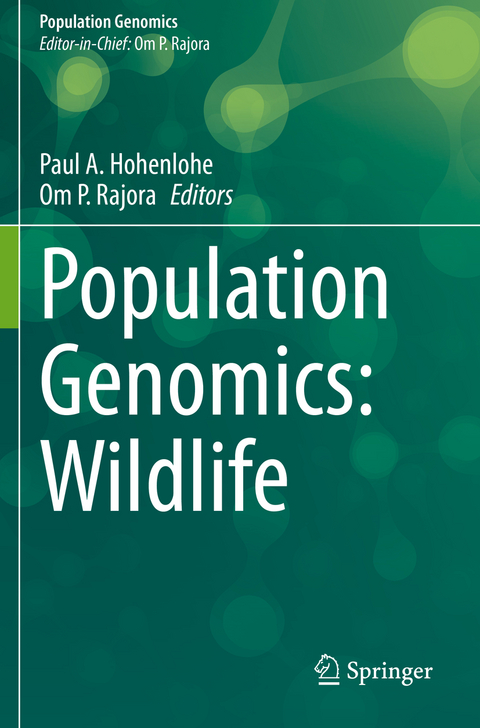
Population Genomics: Wildlife
Springer International Publishing (Verlag)
978-3-030-63491-9 (ISBN)
Dr. Paul A. HohenloheAssociate ProfessorUniversity of Idaho
Department of Biological SciencesInstitute for Bioinformatics and Evolutionary Studies
Moscow, IDUSA
Dr. Om P. RajoraProfessorUniversity of New BrunswickFaculty of Forestry and Environmental ManagementFredericton, NBCanada
Part I: Introduction.- Population Genomics of Wildlife: Research Goals, Approaches and Applications.- Part II: Wildlife Sampling and Genomics Technologies.- Advances in Using Non-invasive, Archival, and Environmental Samples for Population Genomic Studies.- Environmental Population Genomics: Challenges and Opportunities.- Surmounting the Large-Genome "Problem" for Genomic Data Generation in Salamanders.- Part III: Wildlife Populations: Ecology, Evolution and Adaptation.- Landscape Genomics for Wildlife Research.- Population Genomics of Ungulates.- Advancing Understanding of Amphibian Evolution, Ecology, Behavior, and Conservation with Massively Parallel Sequencing.- Population Genomics of Birds: Evolutionary History and Conservation.- Population Genomics Provides Key Insights into Admixture, Speciation, and Evolution of Closely Related Ducks of the Mallard Complex.- Part IV: Challenges Facing Wildlife Populations.- Population Genomics and Wildlife Adaptation in the Face of ClimateChange.- Applications of Population Genomics for understanding and Mitigating Wildlife Disease.- Population Genomics of Wildlife Cancer.- Part V: Wildlife Conservation and Management.- Population Genomics for the Management of Wild Vertebrate Populations.- Genomics for Genetic Rescue.- Ex Situ Wildlife Conservation in the Age of Population Genomics.- Population Genomics Advances and Opportunities in Conservation of Kiwi (Apteryx spp.).- The Transformative Impact of Genomics on Sage-Grouse Conservation and Management.
"The book ... admirably cover the breadth of current focal areas in wildlife genetics. ... Perhaps most impressively, and most usefully, many chapters address a common issue for geneticists: how to effectively bridge the gap between research and application. ... This chapter, combined with an entire part devoted to conservation and management, cements this volume as a valuable tool for students, researchers, and managers working across the broad spectrum of wildlife genomics research." (Paige A. Byerly, The Quarterly Review of Biology, Vol. 97 (3), September, 2022)
“The book … admirably cover the breadth of current focal areas in wildlife genetics. … Perhaps most impressively, and most usefully, many chapters address a common issue for geneticists: how to effectively bridge the gap between research and application. … This chapter, combined with an entire part devoted to conservation and management, cements this volume as a valuable tool for students, researchers, and managers working across the broad spectrum of wildlife genomics research.” (Paige A. Byerly, The Quarterly Review of Biology, Vol. 97 (3), September, 2022)
| Erscheinungsdatum | 12.12.2021 |
|---|---|
| Reihe/Serie | Population Genomics |
| Zusatzinfo | XIV, 558 p. 1 illus. |
| Verlagsort | Cham |
| Sprache | englisch |
| Maße | 155 x 235 mm |
| Gewicht | 866 g |
| Themenwelt | Informatik ► Weitere Themen ► Bioinformatik |
| Naturwissenschaften ► Biologie ► Genetik / Molekularbiologie | |
| Schlagworte | Bioinformatics • Evolutionary genetics • Evolutionary Genomics • Wildlife adaptation • wildlife biology |
| ISBN-10 | 3-030-63491-4 / 3030634914 |
| ISBN-13 | 978-3-030-63491-9 / 9783030634919 |
| Zustand | Neuware |
| Informationen gemäß Produktsicherheitsverordnung (GPSR) | |
| Haben Sie eine Frage zum Produkt? |
aus dem Bereich


